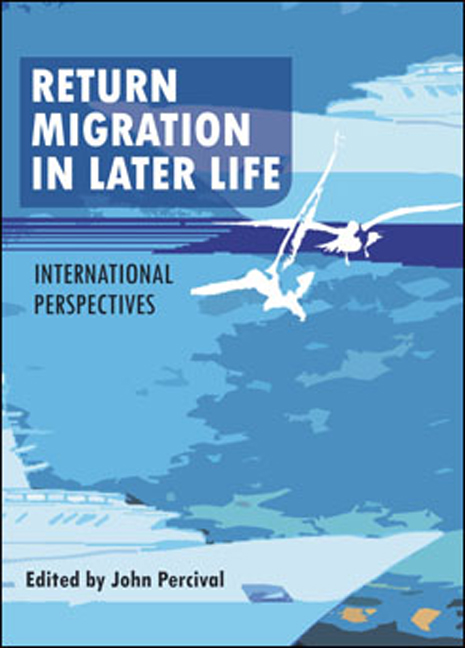Book contents
- Frontmatter
- Contents
- List of tables and figures
- Notes on contributors
- Acknowledgements
- one Charting the waters: return migration in later life
- two Older immigrants leaving Sweden
- three Place and residence attachments in Canada’s older population
- four Ageing immigrants and the question of return: new answers to an old dilemma?
- five Caribbean return migration in later life: family issues and transnational experiences as influential pre-retirement factors
- six ‘We belong to the land’: British immigrants in Australia contemplating or realising their return ‘home’ in later life
- seven Diasporic returns to the city: Anglo-Indian and Jewish visits to Calcutta in later life
- eight Returning to ‘roots’: Estonian-Australian child migrants visiting the homeland
- nine Ageing in the ancestral homeland: ethno-biographical reflections on return migration in later life
- ten ‘The past is a foreign country’: vulnerability to mental illness among return migrants
- eleven The blues of the ageing retornados: narratives on the return to Chile
- twelve Concluding reflections
- Endnotes
- Index
seven - Diasporic returns to the city: Anglo-Indian and Jewish visits to Calcutta in later life
Published online by Cambridge University Press: 01 February 2022
- Frontmatter
- Contents
- List of tables and figures
- Notes on contributors
- Acknowledgements
- one Charting the waters: return migration in later life
- two Older immigrants leaving Sweden
- three Place and residence attachments in Canada’s older population
- four Ageing immigrants and the question of return: new answers to an old dilemma?
- five Caribbean return migration in later life: family issues and transnational experiences as influential pre-retirement factors
- six ‘We belong to the land’: British immigrants in Australia contemplating or realising their return ‘home’ in later life
- seven Diasporic returns to the city: Anglo-Indian and Jewish visits to Calcutta in later life
- eight Returning to ‘roots’: Estonian-Australian child migrants visiting the homeland
- nine Ageing in the ancestral homeland: ethno-biographical reflections on return migration in later life
- ten ‘The past is a foreign country’: vulnerability to mental illness among return migrants
- eleven The blues of the ageing retornados: narratives on the return to Chile
- twelve Concluding reflections
- Endnotes
- Index
Summary
The city of birth as a focus of return
The city is a central focus of research on diasporic resettlement, with studies of urban cosmopolitanism and/or multiculturalism alongside work on urban policy, employment, the built environment, consumption, and cultural and artistic practice. Less attention has been paid, however, to the city as a site of diasporic return. While research on return visits and return migrations is diverse and wide-ranging, including historical research on migrant homecomings (Gowans, 2001; Harper, 2005; Wyman, 2005) alongside more contemporary research on first- and second-generation returns (King and Christou, 2010), the repatriation of refugees (Hammond, 2004) and ‘heritage tourism’ (Basu, 2007), most of this work has focused on returns to the nation and/or ‘homeland’.
Ideas about the ‘homeland’ as a site of return have been central not only to well-established and critiqued notions of a diasporic ‘myth of return’ (Brah, 1996; King and Christou, 2010), but have also informed a wide range of research on return in practice. Ideas and practices of return to a ‘homeland’ are often bound up with, and articulated through, understandings about shared ethnic and other identities, genealogical connections, personal and inherited memories, and attachments to place and landscape (Baldassar, 2001; Thomson, 2005). A wide range of work explores the challenges of return, particularly in terms of how ideas about home, ethnicity, identity and culture might become unsettled and uncertain alongside the difficulties of reconciling a remembered and/or imagined past with life in the present (Kibria, 2002; Bunkše, 2004; Christou and King, 2006; Tsuda, 2009). While much of the literature on return migration focuses on the significance of generation more than age (Kibria, 2002; Christou and King, 2006; Tsuda, 2009), other work focuses on particular groups such as those of working age (Potter et al, 2005; Conway and Potter, 2009). Research on return visits rather than permanent migrations spans work on particular age groups (including Dwyer, 2002, on young British Asian women visiting Pakistan) and across different age groups and generations (including Baldassar, 2001). Less work, however, has focused specifically on return visits by migrants in later life.
This chapter is about return visits by retired members of two minority communities from Calcutta. Through its focus on the Anglo-Indian and Jewish communities and their migration to London, Toronto and Israel since 1947, the chapter has two main aims.
- Type
- Chapter
- Information
- Return Migration in Later LifeInternational Perspectives, pp. 141 - 160Publisher: Bristol University PressPrint publication year: 2013

